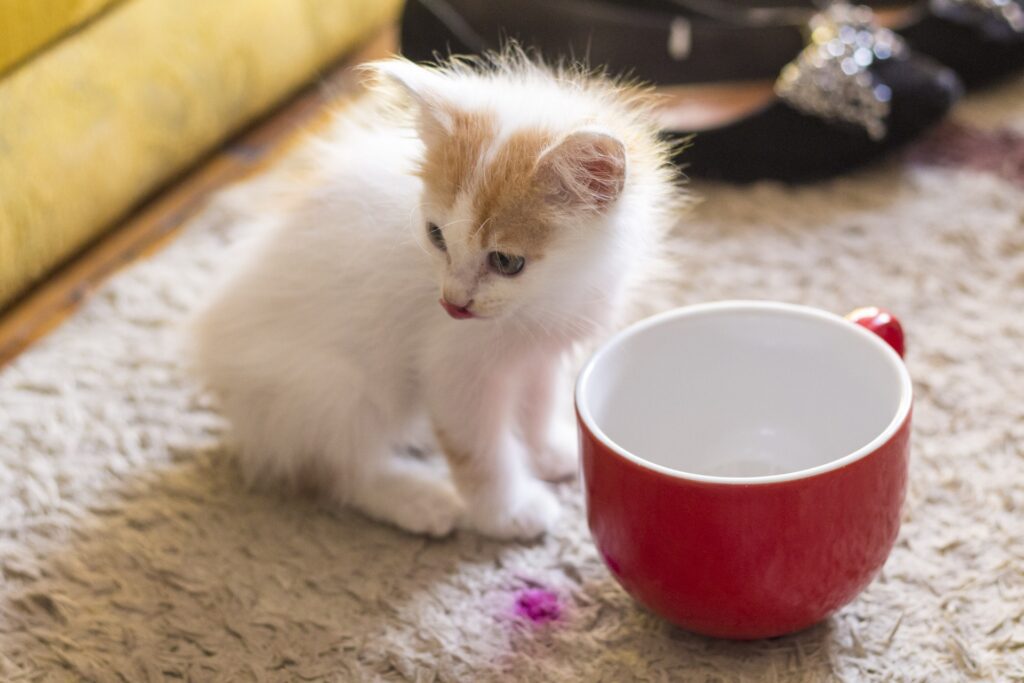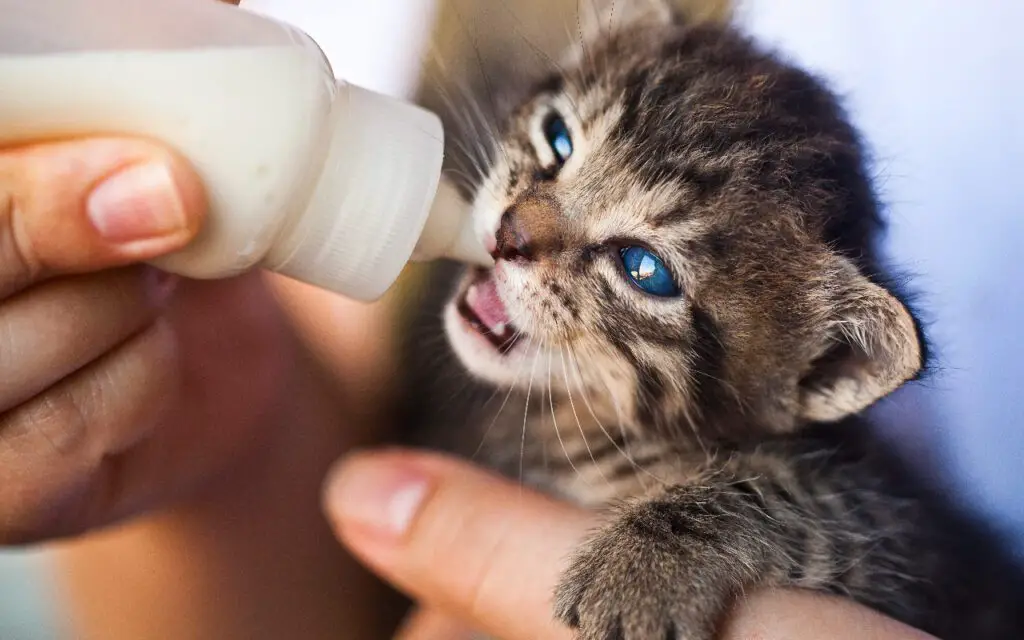Kittens that are only a few weeks old need to be fed special diets. This diet should include nutrition-dense food that is tailored to the kittens’ needs and growth stage.
It is important to provide the right type of food for your kitten’s health, well-being, and development.
- Key Takeaway
- What To Feed Kittens That Are Only a Few Weeks Old?
- How Often Should Few Weeks Old Kittens Eat?
- How Do I Feed a Newborn Kitten?
- Can 3-week-old Kittens Drink Regular Milk?
- Can a 3-week-old Kitten Survive Without Its Mother?
- FAQs
- Q: How often should I feed the kittens?
- Q: When can kittens start eating solid food?
- Q: What type of food is best for kittens?
- Q: Can I feed the kittens regular cat food?
- Q: How much should I feed a newborn kitten?
- Q: How do I hold the kittens while feeding them?
- Q: How do I wean kittens from milk to solid food?
- Q: How do I keep the kittens warm?
- Q: Can I feed orphaned kittens without the mother?
- In Conclusion
Key Takeaway
- Kittens that are only a few weeks old should ideally be fed with a kitten milk replacer, and as they grow older (around 5 to 6 weeks), they can start to be introduced to wet food mixed with kitten kibble, gradually transitioning to primarily dry food by the time they are 7 weeks old.
- Kittens that are a few weeks old should be bottle-fed with a kitten milk replacer every two to three hours around the clock.
What To Feed Kittens That Are Only a Few Weeks Old?

Kittens that are a few weeks old should eat a nutritional substitute called kitten milk replacer is often used since they cannot digest regular milk.
As the kittens grow older, around four to six weeks, they can be gradually weaned off the formula. This process involves introducing wet cat food mixed with water.
By five to six weeks, kittens should start eating kitten kibble mixed with wet food.
At seven weeks and beyond, their diet should consist mainly of dry food, but wet food can still be included.
Some kittens may refuse wet food, so having a small, highly scented kibble option available can help transition them.
Always ensure fresh water is available for kittens from the time solid food is introduced.
How Often Should Few Weeks Old Kittens Eat?

Few weeks-old kittens should be fed every three to four hours, totaling around 6-8 feedings a day, with the frequency decreasing and the amount of food increasing as they grow older.
Kittens that are only a few weeks old require frequent feeding.
For kittens, until they are 10 days old, they should be fed every two hours, around the clock. Once kittens are older than 10 days, they can eat every three to four hours.
Kittens up to two weeks old can generally consume their daily intake of 4-5 meals per day.
If the kittens do not have a mother to feed them, they need to be bottle fed more regularly, about 6-8 feedings a day.
Remember, these young kittens should be fed with a nutritional substitute like kitten formula, not cow’s milk, as they cannot digest it properly.
How Do I Feed a Newborn Kitten?
- Obtain a kitten milk replacer formula, as newborn kittens can’t digest cow’s milk.
- Use a small bottle or syringe specifically designed for feeding kittens.
- Feed the kitten every three hours, around the clock.
- Ensure the kitten is in a belly-down position to mimic natural nursing.
- Carefully insert the syringe or bottle nipple into the kitten’s mouth and allow them to suckle at their own pace.
- Feed the kitten about 8 milliliters of formula per ounce of body weight per day.
- Do not overfeed the kitten; their stomach should be full but not distended.
- Clean the kitten’s face and paws after each feeding.
- Monitor the kitten’s weight gain regularly to ensure they are growing properly.
- Begin weaning the kitten onto solid food mixed with formula around four weeks of age.
Can 3-week-old Kittens Drink Regular Milk?
Three-week-old kittens should not drink regular cow’s milk as it is difficult for them to digest and can cause illness.
Instead, they should be fed a kitten milk replacer which is specially designed to meet their nutritional needs.
Goat’s milk or homemade milk recipes are also not recommended. If mother’s milk is not available, a commercial kitten milk replacer is the best alternative.
It’s important to feed them every two to three hours and they should consume at least half a tablespoon of formula or milk during each feeding.
Can a 3-week-old Kitten Survive Without Its Mother?
A 3-week-old kitten can survive without its mother, but it requires careful attention and care. Ideally, the mother cat should be present as she provides the best nutrition and care for her kittens.
However, if she’s not available, you can step in as a caregiver. Kittens at this age are still dependent on milk for nutrition, so they will need to be bottle-fed with a kitten milk replacer.
It’s also crucial to keep them warm because they cannot regulate their body temperature yet.
Additionally, they will need help with elimination, which is normally stimulated by the mother’s licking.
Despite these efforts, the survival rate for kittens less than three weeks old without their mother can be low, even with proper care.
FAQs
Q: How often should I feed the kittens?
A: For kittens without a mother, they will need to be fed every two hours. As they grow older, you can gradually reduce the frequency of feedings.
Q: When can kittens start eating solid food?
A: Kittens can start eating solid food when they are around four to five weeks old. Before that, they should be primarily fed with a milk replacer.
Q: What type of food is best for kittens?
A: Wet food is typically the best choice for kittens, as it provides them with the necessary hydration. You can also consider specialized kitten food that is formulated to meet their nutritional needs.
Q: Can I feed the kittens regular cat food?
A: It is recommended to feed the kittens with specially formulated kitten food instead of regular cat food. Kitten food contains higher levels of nutrients needed for their growth.
Q: How much should I feed a newborn kitten?
A: Newborn kittens should be fed small amounts of formula or milk replacement every two to three hours, approximately about 2 to 4 milliliters per feeding.
Q: How do I hold the kittens while feeding them?
A: When holding the kittens, make sure to support their head and bottom, and cradle them gently in your hands. Avoid putting pressure on their belly.
Q: How do I wean kittens from milk to solid food?
A: To wean kittens, gradually introduce small amounts of wet food mixed with formula or milk replacer. Over time, increase the ratio of solid food to milk until they are solely eating solid food.
Q: How do I keep the kittens warm?
A: You can provide a warm and cozy environment for the kittens by using a heating pad or placing a warm water bottle wrapped in a towel in their bedding area.
Q: Can I feed orphaned kittens without the mother?
A: Yes, orphaned kittens can be bottle-fed with a kitten formula or milk replacement that is specifically formulated for their nutritional needs.
In Conclusion
Kittens that are only a few weeks old should be fed with specially formulated kitten food, which is rich in proteins and other essential nutrients to ensure their healthy growth and development.
Kitten-specific wet or dry food should be chosen carefully for a balanced diet.
Additionally, kittens need access to fresh water at all times to ensure proper hydration.





Leave a Reply